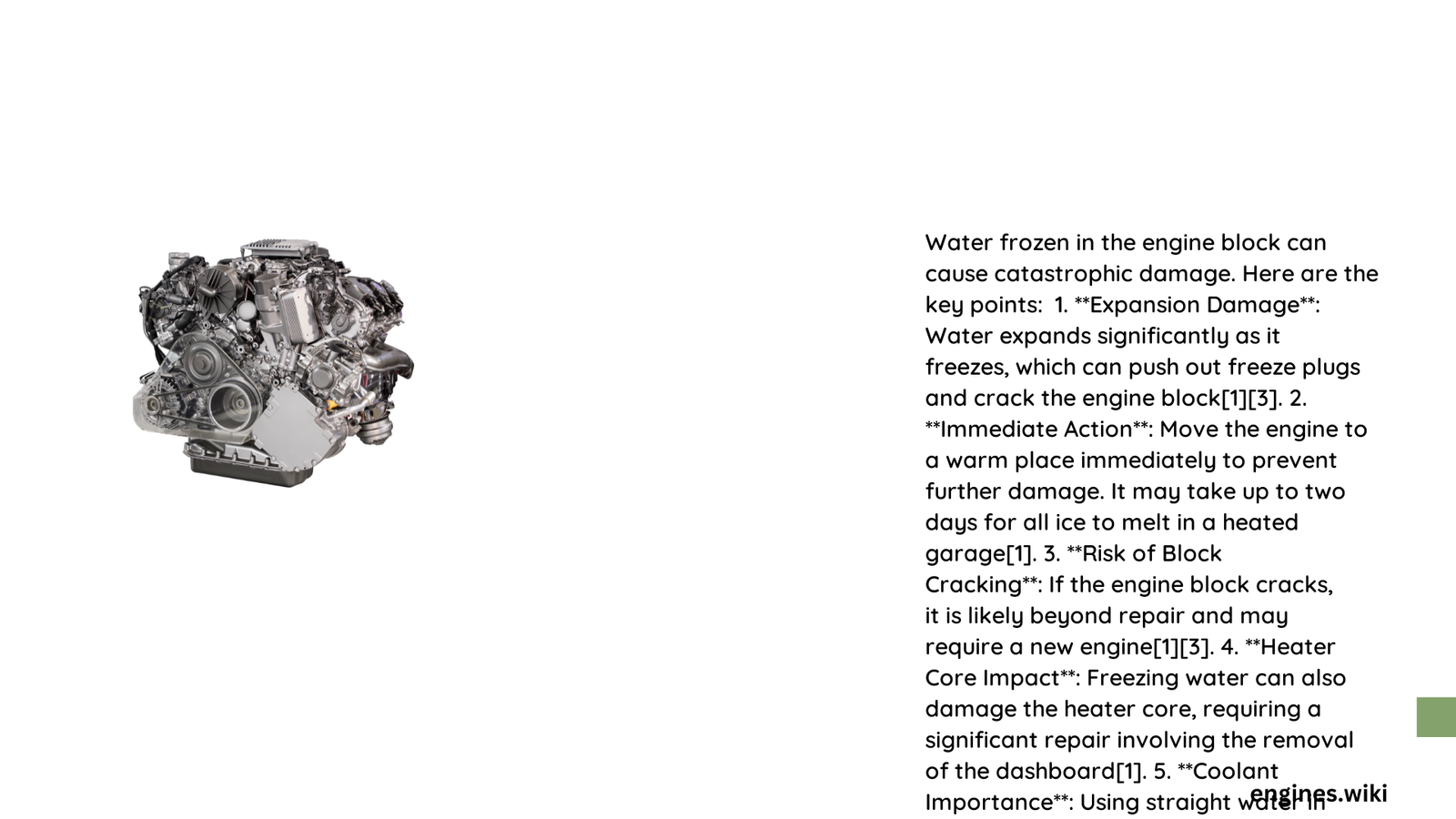When water freezes inside an engine block, it transforms from a harmless liquid into a potentially catastrophic threat. The expansion of frozen water can create immense pressure, leading to microscopic cracks, structural damage, and potentially complete engine failure. Vehicle owners must understand the complex dynamics of water freezing, its potential consequences, and strategic prevention methods to safeguard their automotive investments.
What Happens When Water Freezes in an Engine Block?
Water’s unique physical properties make it particularly dangerous when trapped inside an engine block. Unlike most substances, water expands approximately 9% when transitioning from liquid to solid state, creating tremendous internal pressure.
Key Risks of Frozen Water in Engine Block
| Risk Level | Potential Damage | Estimated Repair Cost |
|---|---|---|
| Low | Minor coolant system stress | $100 – $500 |
| Medium | Hairline cracks in block | $500 – $2,000 |
| High | Complete engine block failure | $3,000 – $8,000 |
How Does Water Freeze in an Engine Block?

Several critical factors contribute to water freezing within an engine block:
- Temperature Conditions
- Ambient temperatures below 32°F (0°C)
- Insufficient antifreeze concentration
-
Prolonged exposure to cold environments
-
Coolant System Vulnerabilities
- Aged or degraded coolant
- Improper maintenance
- Low coolant levels
What Preventive Measures Can Protect Your Engine?
Antifreeze Strategy
Implementing a robust antifreeze strategy involves:
- Maintaining a 50:50 water-to-antifreeze ratio
- Using high-quality ethylene glycol-based coolants
- Regular coolant system inspections
- Checking freeze point with professional refractometers
Winter Preparation Checklist
- ✅ Test coolant concentration
- ✅ Inspect cooling system components
- ✅ Replace worn hoses and gaskets
- ✅ Use engine block heaters in extreme conditions
Can Different Engine Materials React Differently?
Engine block materials significantly influence freeze damage potential:
- Cast Iron Blocks
- More resistant to thermal stress
- Higher structural integrity
-
Slower heat transfer
-
Aluminum Blocks
- More susceptible to cracking
- Faster heat conduction
- Requires more precise coolant management
What Are Professional Thawing Techniques?
Recommended Thawing Methods
- Block heaters
- Controlled ambient warming
- Professional mechanical intervention
- Gradual temperature increase
Warning: Avoid rapid heating techniques that might cause thermal shock.
Cost Considerations for Freeze Damage
| Damage Level | Repair Complexity | Estimated Cost |
|---|---|---|
| Minor Crack | Low intervention | $500 – $1,500 |
| Moderate Damage | Medium complexity | $1,500 – $4,000 |
| Severe Failure | Complete replacement | $4,000 – $8,000 |
Expert Recommendations
- Always use manufacturer-recommended coolant
- Perform annual cooling system maintenance
- Monitor coolant condition regularly
- Invest in quality antifreeze products
Conclusion
Understanding water frozen in engine block dynamics is crucial for preventing expensive automotive repairs. Proactive maintenance, strategic preparation, and timely interventions can protect your vehicle’s critical components.
